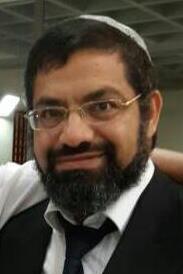You shall be Holy
By: Rav Yishai Buchris
"Speak to the entire assembly of Bnei Yisrael and say to them: You shall be holy, for holy am I, Hashem, your G-d." (Vayikra 19:2) The Midrash Rabbah, quoted by Rashi, comments that this parsha was said at the assembly of hakhel, as it says, "Speak to the entire assembly of Bnei Yisrael." The reason for this was, "because most of the fundamentals of the Torah are dependent on it." This command, "You shall be holy," is unclear. What is the meaning of the word "holy," and what is the way to become holy? Many of the commentators, Rishonim and Achronim, explain this mitzvah, each one in his own way:
Rashi explains, "You shall be holy" -- separated from the arayot (forbidden relationships). The way to holiness is by taking care to avoid any of the prohibitions of the arayot.
The Ramban explains that to be "holy" means curtailing even permitted gratification. There is a prohibition against being base even within the framework of the halacha, and because of this one has to be careful to limit even permissible matters, such as drinking wine and allowed relationships.
However, it is still difficult to understand, in what way are "most of the fundamentals of the Torah dependent on it?" Whether according to Rashi's explanation that "holy" means to separate from the arayot, or even according to the Ramban that this mitzvah is more inclusive, why is this such a fundamental commandment?
The Rishonim established a principle in Sefer Bereishit, "ma'aseh avot siman labanim - the actions of the patriarchs are a sign for their children." Besides the simple meaning, that what happened to the patriarchs is a microcosm of what will occur to the children, the Ramban adds another level of explanation. Through the actions of the patriarchs character traits were planted in the children, and those traits were formed by the patriarchs through their actions. For example, the trait of mesirut nefesh (self-sacrifice, dedication) that existed throughout the generations was entrenched within us by "akeidat Yitzchak," in which there was mesirut nefesh on the part of both Avraham and Yitzchak.
It says in the Midrash that when Daniel, Chanania, Mishael and Azarya sacrificed themselves for the sanctification of G-d's name, Hashem said to the angels: Go and kiss the lips of the forefathers of these, of Avraham and of Yitzchak; of Yitchak at the event of the akeidah, and of Avraham at Ur Kasdim, who sacrificed themselves for the sanctification of G-d's name. It is possible that the reason that the lips of the forefathers should be kissed is because they instilled this character trait of mesirut nefesh in their descendants so that Daniel and his friends would be able to use it.
In masechet Gittin (57a), the story is told of Hannah and her seven sons. Even when the seventh and youngest son was taken out to be killed, his mother instructed him as follows: Go and tell Avraham, "You bound one altar, and I bound seven altars!" This requires explanation: was this righteous woman trying to challenge Avraham and say that she is greater then he? However, according to what we explained earlier, it is possible that Hannah's intention was, "You bound one altar, and by virtue of this I bound seven altars."
If so, it is possible that the commandment, "You shall be holy," is also based on the actions of the avot. We will try, therefore, to delve into the trial of Avraham avinu in the akeidah, to see if the trait of "holiness" may also have roots there. It is possible to say that in the act of the akeidah, Avraham rose completely above his physical self so that at that moment Yitzchak appeared to him as a ram, as it says, "he saw -- behold, a ram! -- afterwards (achar)," and Chazal comment, "another (acher)," namely, that Yitzchak had also appeared to him at that moment like a ram.
However, it seems that the Midrash did not view the akeidah in this way, but rather Avraham was in a state of, "Eyes crying bitterly, but with a happy heart." In this vein a number of the later commentators explain the dialogue between Avraham and Yitzchak (Bereishit 22:7):
Then Yitzchak spoke to Avraham his father and said, "Father --"
And he said, "Here I am, my son,"
And he said, "Here are the fire and the wood, but where is the lamb for the offering?"
What is the need for the first part of the dialogue, "[Yitzchak] said, 'Father --,' and he said, 'Here I am, my son'?" Is it not sufficient that Yitzchak would ask, "Where is the lamb for the offering?" The commentators explain that Yitchak asked Avraham, "Are you still my father, or perhaps you have become so lofty now and you are like an angel?" To this Avraham answered, "Here I am, my son" -- I am still your father. It was in this manner that the akeidah was performed. It is further possible that this was the main aspect of the trial, namely: Be a father! Be merciful! Nonetheless, do that which G-d commands you!
It is possible, then, that this is the meaning of, "You shall be holy." Do not be like angels, detached from the physical world, when you perform the mitzvot, but rather, like "holy people." It is then, indeed, understandable that this is a fundamental mitzvah of the Torah!
Shiur ID: 3747
Do you have a comment or question on the shiur?
Comment below and we'll join the discussion
Add your comments:



.jpg)

